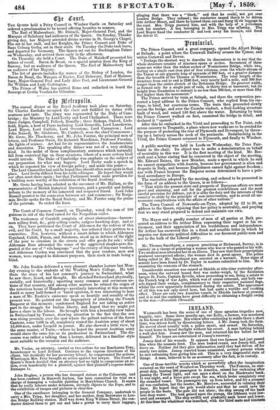Vroolurial.
The Prince Consort, and a great company, opened the Albert Bridge at Saltash ; a point where the Cornwall Railway crosses the 'riamar, and unites Cornwall and Devon.
" Perhaps the shortest way. to describe its dimensions is to gay that the whole structure consists of nineteen spans or arches. Seventeen of these spans are wider than the widest arches of Westminster Bridge, • while two, resting on a single cast-iron pier of four columns, cross the whole stream of the Tamar at one gigantic leap of upwards of 900 feet, or a greater distance than the breadth of the Thames at Westminster. The total length of the structure from end to end is 2240 feet, very nearly half a mile, add 300 feet longer than the entire stretch of the Britannia Bridge. Its greatest width, as formed only for a single pair of rails, is thirty feet at basement, but its height from foundation to summit is no fess than 260 feet, or more than fifty feet higher than the monument."
The Prince arrived by train at Saltash, and there the corporation pre- sented a loyal address to the Prince Consort, who replied from his car- riage, in brief, but courteous terms. The train then proceeded slowly across the bridge, and over the Coombe viaduct, a frail-looking structure built of wood, and raised 160 feet above the water. Returning by train the Prince Consort walked on foot, examined the bridge in detail, and declared it " opened." After this he embarked in the Vivid and proceeding to Tor Point, rode across country to Tregantle, a place where new works are to be erected for the purpose of protecting the rear of Plymouth and Devonport, by throw- ing up a battery across the neck of the peninsula. Reembarking in the Vivid, the Prince Consort returned to Plymouth, and finally to Windsor.
A public meeting was held in Leeds on Wednesday, Sir Peter Fair- bairn in the chair. Its object was to make a demonstration on behalf of neutrality in this war. It is the first meeting of the kind. Mr. Bee- croft sent a letter stating that he concurred in the object of the meeting. Mr. Edward Baines, the new Member, made a speech in which he said. we cannot sympathize with Austria, because her government is alien and. despotic in Italy, and because Englishmen cannot fight against freedom ; nor with France because the Emperor seems determined to have a poli- tical ascendancy in Europe. The resolution adopted by the meeting, and ordered to be presented in the form of an address to the Queen, is as follows-
" That while the present state and prospects of European affairs are most grave and alarming, and call for the greatest watchfulness and the most careful provision for defence, .yet it is alike the duty and the interests of this country to abide by the principle of non-intervention, and to avoid all un- necessary complications with the affairs of other nations."
The Town Council of Newcastle-on-Tyne, adopted by 22 to 20, an address to the Queen, rejoicing that her policy is neutrality, and praying that we may stand prepared to defend and maintain our own.
The Mayor and a goodly number of men of all parties at Bath pre- sented an address to Sir Arthur Elton expressing their regret at his re- tirement, and their appreciation of his truthfulness and independence. Sir Arthur has answered this in a frank and sensible letter in which he imputes our domestic political difficulties to our foremost public men and not to the bulk of the Liberal party.
Mr. Thomas Smethurst, a surgeon practising at Richmond, Surrey, is in custody on a charge of poisoning a woman who was or who passed as his wife. Two medical men attended her in an illness. They saw that their prescriptions produced unexpected effects ; the woman died in great agony. Thepolice being called in Mr. Smethurst was arrested on a warrant. Some signs of arsenic have been found by Dr. Taylor in matters submitted to him. He is examining the contents of the stomach.
Considerable sensation was caused at Shields at tide-time yesterday after- noon, when the outward bound fleet was under-weigh, by the Sardinian barque St. Paolo, Captain Revelle,.when proceeding to sea, firing a salute to the French brig of war Agile, which was of course returned, and both ves- sels dipped their ensign, complimentary to their respective national flags, whilst the crew apparently fraternised during the salute. The appearance of all this was not only novel here, but had quite a warlike and exciting effect. There are only two Austrian vessels in Shields harbour at present, and it is said the captains have great difficulty in obtaining a freight owing to the war.—Heireastk Chronicle.


























 Previous page
Previous page